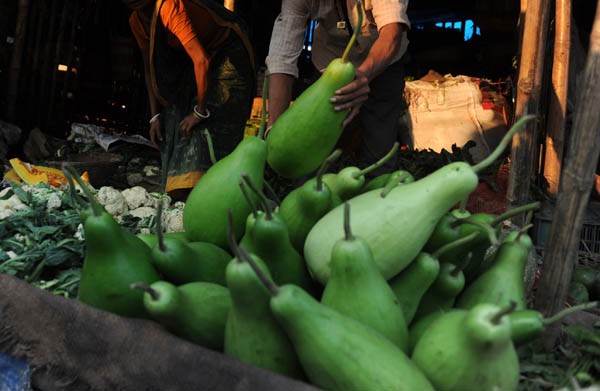

Kaddus, fish, apples, bell peppers, oranges… these are all the items you can find being sold all around Lahore this time of the year, whether in shops or on street carts. It’s one of the great things about living in the fertile river valley that is Punjab. But go to a place like Hyperstar in Fortress Stadium and you will notice that the same products are also being imported.
Kaddus from Malaysia, frozen fish from Thailand, apples from America, bell peppers from Holland, Oranges from South Africa… These products are usually at least two or three times more expensive than the local variety. They are obviously not as fresh and often not as tasty as their Pakistani equivalents. But people buy them. Why so?
Things are generally imported into a country if either they are not available within the country or if they are of poor quality. If things are both available and in good quality, why import them?
I think the cause has nothing to do with the supply. It doesn’t even have to do with the products, because that’s not what people are really buying when they buy imported goods. What they are looking for is a commodity that is much more valuable in our society: social capital. We are a country that functions based primarily on personal relationships, and those relationships depend on how you are perceived. If you are perceived well, you have a much better chance at success.
In our society, status functions not just to satisfy a person’s ego, it’s a near-necessity for people trying to get ahead in life. Thus, everything that affects people’s opinion of you has become disproportionately important, from the clothes you wear to the origin of the food you eat.
People’s perceptions of you are significant not just in Punjab or in Pakistan. Clearly, perceptions are important for success in any society. After all, every employer is a person too, no matter where you go. The difference is that in other places people seem to have become more aware of how fallible people’s perceptions of each other often are, and have made attempts to control the influence of those perceptions in society. In America, for example, the impetus of the Civil Rights movement helped people make changes that addressed systemic biases in the way people regard each other. Thus, the system tries to limit how much power people’s personal impressions have in making important decisions.
The biases in Pakistan are in some ways different. There is undeniably a bias against darker skin colour (the plethora of whitening creams is a testament to that fact), but there is also a bias against almost anything local. Foreign products, languages… even foreign lifestyle practices are valued more highly than local ones. Perhaps, this has something to do with the legacy of the British rule.
Whatever the reasons for these biases, the point is that they don’t help us. Biases exist in every person and in every society, and it is not necessary to eliminate them, but we still have to grapple with them and try to limit their influence as much as we can.
I think we as humans have a natural tendency to seek things that boost our own image. This isn’t inherently bad: having a positive image helps us achieve our goals. But when the system is such that image is the most important ingredient for success, boosting personal image becomes an end in itself.
People’s focus gets diverted from things that are potentially productive to things that, it seems to me, are not productive at all. I don’t think buying an overpriced kaddu from Malaysia helps anyone, not even the person who ends up eating it. Because I think Punjabi kaddus are better. The aroma wafting from the kitchen smells pretty damn good to me. It’s kaddu, from Punjab.